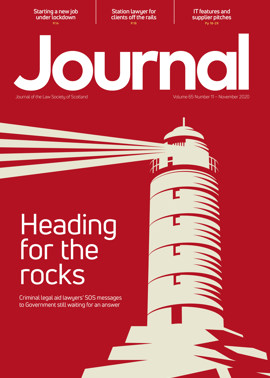Leading legal excellence in a pandemic
Many things have changed since the Law Society of Scotland launched the first Leading Legal Excellence strategy in 2015. Setting a medium-term plan for the future is always challenging, but it would be fair to say that no one expected what 2020 would bring when that was set as the date for the next formal review of the strategic direction of the organisation.
Work actually began last year on what the new strategy would look like. There was consultation widely both within and outwith the profession on what the key issues were, just now and for the future. However, at a fairly early stage in this unpredictable and challenging year it became clear that the immediate challenges needed to be the primary focus. The Society’s Council agreed that a shorter two-year plan was more appropriate in the circumstances.
President Amanda Millar commented: “The pandemic has crystallised priorities for the profession. Throughout this crisis the Society has been at the forefront in advocating for our members, their clients and wider society to the heart of government. We have consistently highlighted the important role the legal profession plays in supporting businesses and individuals and the risks to justice if support to this sector fails.”
This includes the impact on legal aid practitioners, as highlighted elsewhere in this issue, as well as the wider challenges faced by businesses and individuals working in the sector. These challenges are at the forefront of the new Leading Legal Excellence strategy for 2020-22.
Assuring and supporting
Of the five key themes within the strategy – Assure, Support, Excel, Influence and Evolve – it’s Support which most specifically highlights the needs of a sector looking to what comes next after the pandemic: “We support members to meet the challenges of a recovering legal services market and economy.”
Within the Support theme there is a focus on using technology and promoting wellbeing to support the profession as it adapts to new ways of working – alongside careers work to champion fairness and progression, assisting those who have become unemployed or underemployed as a result of market uncertainties.
Millar is keen to highlight, however, that there is also much that has not changed for the organisation. “We have not lost sight of our core responsibilities. Our regulatory role remains fundamental as we maintain and support high standards for our members, for the benefit of the whole profession and the public they serve.
“Nor have we forgotten our responsibilities to equality, and supporting a diverse profession which is representative of our communities – highlighting a range of voices, and working to ensure that no one with the right knowledge and skills is excluded from law as a career.”
The Assure theme highlights this focus: “We assure the quality of legal services, the public interest and the reputation of the profession.”
This theme highlights the impact of education and training standards on ensuring excellence, as the profession continues to innovate and develops how it uses technology to support new ways of working. It also looks to regulation as proportionate and risk-based, to build both client confidence and a competitive sector.
The Society evolves
With the public health restrictions driving innovation across the profession, the 2020-22 strategy also highlights the opportunities for a faster pace of digital change. Millar explains: “There have been new opportunities created out of the necessity to support new ways of working. The digitalisation of our courts is driving changes in practice, and artificial intelligence and digital solutions are allowing legal firms to deliver services in new and innovative ways. Embracing digital and helping members to take advantage of the technology available will be a key part of sustaining, recovering and growing the profession in the future.”
Recognising the need for the Society itself to make changes to support this, is part of the Evolve theme. As an organisation the Society is committing to evolving to maintain its own financial sustainability, working to recover commercial operations to take the pressure off core fees and help replenish reserves which were used to support reductions in core fees for members this year.
Against a backdrop of the economic and social challenges presented by the pandemic, the new strategy sets out a pathway to the future. While it is still not easy to predict what comes next, it is clear that the next two years will present both challenges and opportunities, and the Society wants to ensure it is ready and able to respond to these for and with the profession.
View the Leading Legal Excellence 2020-2022 strategy at www.lawscot.org.uk/strategy2022
Regulars
Perspectives
Features
Briefings
- Civil court: keeping justice on the rails
- Employment: Time for a redundancy refresher
- Family: Watch your step with behaviour-based divorce
- Human rights: Inner House message in privacy group chat
- Pensions: The future – the regulator's blueprint
- Scottish Solicitors' Discipline Tribunal
- Crofting law reform: time to act
- In-house, online and in demand
In practice
- Paralegals: 10 years of recognition
- Ask Ash: Too busy, but still insecure
- Property pitfalls: problematic but preventable
- The Word of Gold: Count us out
- Prepare for the tax due date
- The Eternal Optimist: Help to turn the corner
- Appreciation: Ross Paton
- Appreciation: Claire Reilly (Robertson)
- Tenancies succession reminder






